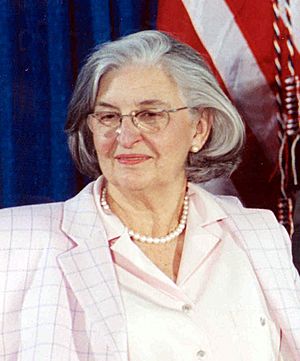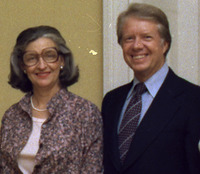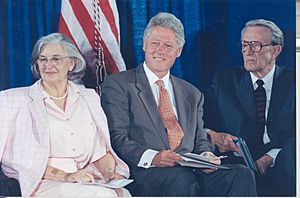Betty Bumpers facts for kids
Quick facts for kids
Betty Bumpers
|
|
|---|---|

Bumpers in 1999
|
|
| First Lady of Arkansas | |
| In role January 12, 1971 – January 3, 1975 |
|
| Governor | Dale Bumpers |
| Preceded by | Jeannette Edris Rockefeller |
| Succeeded by | Claudia Riley (acting) |
| Personal details | |
| Born |
Betty Lou Flanagan
January 11, 1925 Grand Prairie Community Franklin County Arkansas, U.S. |
| Died | November 23, 2018 (aged 93) Little Rock, Arkansas, U.S. |
| Spouse | |
| Children | 3 |
| Occupation | Teacher Activist |
| Known for | Advocacy for immunizations and world peace |
Betty Lou Bumpers (born Flanagan; January 11, 1925 – November 23, 2018) was an American activist. She worked to make sure children got their immunizations (shots to prevent diseases). She also worked for world peace.
Betty Bumpers was the First Lady of Arkansas from 1971 to 1975. Her husband, Dale Bumpers, was the governor of Arkansas during that time. He later became a U.S. Senator. Betty Bumpers and Rosalynn Carter, who was the First Lady of the United States, worked together. They helped make sure all school children in America were immunized.
Contents
Early Life and Family
Betty Lou Flanagan was born in 1925 in a place called Grand Prairie in Franklin County, Arkansas. Her father, Herman Edward "Babe" Flanagan, was a salesman. Her mother, Ola Callans, was a teacher. Betty grew up in Franklin County. During World War II, her family lived in Fort Smith and in Iowa.
Betty studied at the Chicago Academy of Fine Arts and Iowa State University. After college, she became an elementary school teacher. In 1949, she married Dale Bumpers. They had gone to high school together. At the time, Dale was studying to become a lawyer.
After Dale finished law school, they moved to Charleston, Arkansas. Dale worked as a lawyer, and Betty continued teaching. They had three children together.
Helping Kids Get Immunized
In 1970, Dale Bumpers was elected governor of Arkansas. When he started his job in 1971, Betty became the First Lady of Arkansas. She decided to focus on helping children and families.
At that time, Arkansas had one of the lowest rates of childhood immunization in the United States. Betty started a program across the state to give all children their shots. Her program was called "Every Child by '74." Many groups worked together to make it happen. These included the state government, doctors, nurses, the Arkansas National Guard, and volunteers.
The program was a huge success! On one Saturday alone, over 350,000 children received their immunizations. Because of this program, Arkansas became one of the states with the highest rates of childhood immunization. The U.S. Centers for Disease Control and Prevention later used Arkansas's program as a model for the whole country.
In 1975, Dale Bumpers became a U.S. Senator, and the family moved to Washington, D.C.. In 1977, Jimmy Carter became President. Betty Bumpers asked him to support a national immunization program. She also got help from First Lady Rosalynn Carter. They found that only a few states required children to be immunized before school.
Betty and Rosalynn worked together to convince every state to require immunizations for school entry. After just two years, they reached their goal! All 50 U.S. states made it a rule for children to get their shots before starting school.
Later, from 1989 to 1991, a measles outbreak happened, and many children died. Betty Bumpers and Rosalynn Carter worked together again. They started an organization called Every Child By Two. Their goal was to make sure all American children were immunized by age two. Betty Bumpers said that their efforts helped 90 percent of children from birth to age two get their shots by 2012.
Working for Peace
In 1981, Betty Bumpers had a talk with her daughter, Brooke, who was in college. This talk inspired Betty to become a peace activist. She wanted to help end the nuclear weapons race.
They were driving and passed the Clinch River. Brooke asked her mother what they would do if there was a nuclear war. Betty joked, "Well, honey, I guess we’d just go back to Arkansas." But Brooke was serious and asked what if Arkansas was destroyed too. Betty realized her daughter was truly worried about nuclear war. This made Betty want to start a campaign for peace.
Betty talked with other women in Washington, D.C., including wives of Senators. She wanted to get everyday American women involved in stopping the nuclear weapons race. She used her experience from her immunization campaigns.
In 1982, she started an organization called Peace Links in Little Rock. Peace Links worked with groups like garden clubs and parent teacher associations. They taught women about the dangers of the nuclear arms race. They encouraged women to work for world peace.
Soon, Peace Links grew beyond Arkansas. It had about 30,000 members across the United States. It worked as a national organization for almost 20 years. It closed in 2001 after the end of the Cold War.
Later Life and Legacy
In their later years, Betty and Dale Bumpers lived in Little Rock, Arkansas. Betty and Rosalynn Carter continued to lead the Every Child By Two organization. Dale Bumpers, her husband of 66 years, passed away in January 2016.
Betty Bumpers passed away on November 23, 2018, in Little Rock. She was 93 years old.
The National Institutes of Health Vaccine Research Center was named after Betty and Dale Bumpers. This was to honor their work in promoting childhood immunizations and vaccine research.
Betty Bumpers received many awards for her important work, including:
- Woman of Conscience Award from the National Council of Women of the United States, 1985
- The first Wilton Peace Prize from the Unitarian Universalist Church, 1986
- Distinguished Citizen Award from the Governor of Arkansas, 1987
- Peacemakers Award from the National Peace Institute Foundation, 1989
- Pediatric Nursing Humanitarian Award, 1992
- Surgeon General's Medallion from U.S. Surgeon General Antonia C. Novello, 1993
- Isaac K. Beckes Award from the National League for Nursing, 1997
- Rotary International Polio Eradication Champion award, 1998
- Centers For Disease Control and Prevention Champion of Prevention award, 2000
- Hepatitis Foundation International Humanitarian Award, 2001
- Induction into the National Women's Hall of Fame, 2005
- Billie Ann Myers Paragon Award from the Arkansas Department of Human Services, 2012
In 1994, Peace Links gave her a special Peace Links Founders Award. In 1995, she and her husband shared the Maxwell Finland Award. In 1998, they shared the March of Dimes Citizen of the Year Award for their work on children's health and ending polio. They also received the Excellence in Public Service Award from the American Academy of Pediatrics.
Betty Bumpers also received special honorary degrees from several colleges and universities.
See also
- The Ribbon International
 | James Van Der Zee |
 | Alma Thomas |
 | Ellis Wilson |
 | Margaret Taylor-Burroughs |



